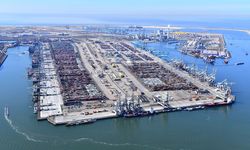This marked a substantial increase of 1.108 million tons compared to the previous year, according to the company's press service.
The surge in transportation volume can be attributed to a significant rise in the shipment of raw materials through the Baku-Tbilisi-Ceyhan (BTC) oil pipeline. In 2023, the volume increased from 250,000 tons to an impressive 1.392 million tons, reflecting a 5.5-fold growth compared to 2022.
Last year, over one million tons of oil were transported along the BTC route from Kazakhstan's Tengiz, a globally renowned deep oil field. Additionally, the port of Aktau facilitated the delivery of nearly two million tons of oil to the port of Makhachkala during the same period.
In 2022, Kazakh President Kassym-Jomart Tokayev emphasized the need to boost oil transportation along the multimodal Trans-Caspian International Transport Route (TITR). Subsequently, a strategic agreement was reached between Kazakhstan's KazMunayGas and Azerbaijan's SOCAR to ensure the annual transportation of up to 1.5 million tons of oil from the Tengiz field along the BTC route.
Situated on the northeastern shore of the Caspian Sea, the Aktau port boasts international significance in long-distance cargo transportation, featuring three dry cargo and three oil terminals.
The BTC pipeline, a key component of this success, comprises eight pump stations – two in Azerbaijan, two in Georgia, and four in Turkey – along with one pressure reduction station, two intermediate pigging stations, and 101 block valves.






